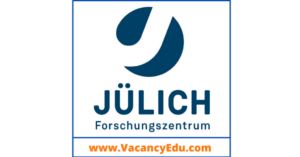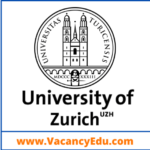Forschungszentrum Julich, Germany invites online Application for number of Fully Funded PhD Degree at various Departments. We are providing a list of Fully Funded PhD Programs available at Forschungszentrum Julich, Germany.
Eligible candidate may Apply as soon as possible.
(01) PhD Degree – Fully Funded
PhD position summary/title: PhD Position – Quantitative Analysis of Carrier Dynamics in Operando Photovoltaic Devices Using Analytical Electron Microscopy
This PhD thesis aims to quantitatively study the initial stages of light conversion into electrical signals in Si-based photovoltaic devices. The research will employ off-axis electron holography, combined with ultra-fast laser excitation and ultra-short electron pulses, to monitor carrier dynamics. The goal is to identify and map regions of high quantum efficiency as well as recombination centers, thereby contributing to the development of improved photovoltaic designs.
Deadline : Open until filled
(02) PhD Degree – Fully Funded
PhD position summary/title: PhD Position – New Synthesis Methods and Production of Polymers and Membranes for PEM Fuel Cells and Electrolyzers
You will join the “Electrocatalytic Interface Engineering” department, led by Prof. Dr.-Ing. Simon Thiele, and the “Membrane Polymer Synthesis” (MPS) team by Dr. Jochen Kerres. The department focuses on the production, analysis, and simulation of functionally optimized structures from the nanometer to the micrometer scale in electrochemically active materials, as well as the development of new materials for catalysis, polymer electrolytes, and polymer electrolyte membranes. Your main responsibilities include:
- Synthesizing and analyzing proton-conducting solid electrolyte polymers
- Producing and characterizing acidic membranes for fuel cells and electrolyzers operating up to 90 degrees Celsius
- Publishing and presenting research results at project meetings, in relevant scientific journals, and at national and international conferences
Deadline : Open until filled
View All Fully Funded PhD Positions Click Here
(03) PhD Degree – Fully Funded
PhD position summary/title: PhD Position – Quantitative evaluation of (macro)economic impacts related to energy system transformations
Deadline : Open until filled
(04) PhD Degree – Fully Funded
PhD position summary/title: PhD Position – CO2 transport and storage: Key to the European energy transition
The transformation of the European energy system to greenhouse gas neutrality will promote independence from fossil fuels. However, it raises the question of how to deal with emissions that cannot be avoided for technical or economic reasons. In the future, these must be captured and stored, used as raw materials, or offset by negative emissions. It can be assumed that storage and utilization sites will not be located directly at the source of emissions, which will require transport infrastructure. As part of this work, you will model spatially resolved transformation paths for the energy system in Germany and Europe and analyze the role of CO2 infrastructures in the design of energy infrastructures. Based on the findings of a related doctoral thesis, options for CO2 capture and utilization and options for negative emission will be integrated into the model. In doing so, you will explore various questions, such as: Where do remaining emissions occur and how can they be dealt with? What infrastructure is needed? What is a cost-effective design for this infrastructure and what framework conditions need to be created? To answer these questions, you will perform the following tasks:
- Identifying relevant technologies for mapping CO2 infrastructure in integrated energy system models
- Enhancing an existing energy system model focusing on CO2 infrastructures
- Analyzing the impact of CO2 on the energy systems design in Germany and Europe
- Active participation in scientific and public discourse (including publishing in peer-reviewed scientific journals)
Deadline : Open until filled
(05) PhD Degree – Fully Funded
PhD position summary/title: PhD Position – Agrogeophysics for Sustainable Soil Management under Climate Extrems
This PhD project will be part of the Green ERA-Hub project AGROSOIL-Agrogeophysics for Sustainable Soil Management under climate extremes. With project partners in Ireland and Uruguay the project aims to examine the effects of various agricultural practices, like fertilizer use and irrigation, on cereal crops, focusing on subsoil`s role in water and nutrient availability and crop resilience, especially under extreme weather conditions. High-resolution subsoil characterization using electromagnetic induction (EMI), electrical resistivity tomography (ERT), and ground penetrating radar (GPR) will be combined with soil sensors systems and UAVs with multispectral cameras.
Deadline : Open until filled
Polite Follow-Up Email to Professor : When and How You should Write
Click here to know “How to write a Postdoc Job Application or Email”
(06) PhD Degree – Fully Funded
PhD position summary/title: PhD Position – Efficient randomization methods for quantum applications
Random unitaries are a ubiquitous tool in quantum information and quantum computing, with applications in the characterization of quantum hardware, quantum algorithms, quantum cryptography and complexity theory, and in the chaotic dynamics of quantum many-body systems. Moreover, a breakthrough result in 2024 shows that random unitaries can often be constructed by short-depth quantum circuits, making these techniques particularly promising for early quantum applications. You will investigate techniques for the construction of random unitaries based on random quantum circuits and study their performance for a range of applications. A focus will lie on quantum algorithms for many-body systems, in particular on classical shadows. Here, you will also transfer results for qubits to fermions, which are highly relevant, for instance, in quantum chemistry. Your research will be embedded in international collaborations with renowned experts, offering plenty of opportunities for close cooperation. You will join the teams of Dr. Markus Heinrich at the Institute for Theoretical Physics of the University of Cologne and of Prof. Matteo Rizzi at PGI-8 at the Forschungszentrum Jülich. You may consult the website of Dr. Markus Heinrich and the one of the Synthetic Quantum Matter division at PGI-8 for an impression of the relevant research. Your tasks in detail:
- Develop techniques for the efficient construction of random unitaries based on quantum circuits
- Transfer these efficient randomization techniques into applications, especially classical shadows
- Model and identify the effects of experimental errors, investigate error mitigation techniques
- Cooperate and actively work with international collaborators
Deadline : 18.5.2025
(07) PhD Degree – Fully Funded
PhD position summary/title: PhD position – Modelling of CO2 capture, CO2 utilization and negative emission options in an energy system model
Analysis of possible applications of CO2 capture and CO2 utilization in the energy system requires detailed techno-economic modelling of these technologies. A major focus of this doctoral thesis is the implementation of these technologies in an integrated energy system model that represents all sectors of the energy system with a high degree of technological detail. This optimization model is based on the institute`s own FINE framework https://github.com/FZJ-IEK3-VSA/FINE CO2 transport and storage should be modelled in a simplified way in the energy system model based on findings from a related doctoral thesis. In addition, natural (e.g. afforestation or rewetting of peatlands) and technical options (e.g. biomass carbon capture or direct air capture) for providing negative emissions should be modelled in detail.
Your tasks in detail:
· Extension of the existing energy system model to include technologies for CO2 capture and CO2 utilization, especially in the industrial sector
· Modelling of natural and technical options for provision of negative emissions
· Simplified representation of CO2 transport and CO2 storage in the energy system model
· Development of scenarios for the use of CO2 capture, CO2 utilization and negative emissions options in a greenhouse gas-neutral energy system
Deadline : Open until filled
(08) PhD Degree – Fully Funded
PhD position summary/title: PhD position – Sample-efficient quantum gate calibration based on quantum optimal control
Among other applications, optimal control theory has proven its utility for the optimal calibration of quantum gates early on and has since been used routinely in experiments. The calibration is typically based on a figure of merit derived from experimental data, such as the average gate fidelity provided by the randomized benchmarking protocol. In realistic scenarios, these quantities however require a significant measurement effort to be estimated, especially in the high-precision regime relevant for fault-tolerant quantum computing.
You will investigate recent advances in characterization and benchmarking protocols for their suitability to provide efficient cost functions for the optimal control of gate calibration in full-stack quantum computers and simulators. Based on your assessment, you will develop new, sample-efficient optimal control approaches for gate calibration and test them in numerical simulations. You will pursue your research with the German research collaboration QSolid, https://www.q-solid.de , coordinated by Forschungszentrum Jülich. You will work with experts in quantum optimal control at Forschungszentrum Jülich (Dr. Felix Motzoi, Dr. Francisco Cardenas-Lopez), and in quantum characterization at the University of Cologne (Dr. Markus Heinrich). We aim at implementing your results in in-house experiments at Forschungszentrum Jülich.
Deadline : Open until filled
Click here to know “How to Write an Effective Cover Letter”
(09) PhD Degree – Fully Funded
PhD position summary/title: PhD Position in Atomic-Scale Quantum Sensing and Information
The research will be part of the recent ERC Starting Grant “Atomic Scale Quantum Sensing and Information with Molecular Nanostructures on a Scanning Probe Tip” (ERC-2024-StG, QuSINT). Our research focuses on the study of quantum magnetism at the atomic scale. We build artificial quantum architectures from single atoms and molecules on surfaces and on probe tips, control their spin states, and study qubit systems. A particular emphasis is on exploiting the manipulation capabilities of scanning probe microscopes to fabricate molecular quantum sensors on probe tips to detect the tiny electric and magnetic fields of quantum systems at the atomic level (Nature Nanotechnology 19, 1466 (2024)), e.g. in emerging quantum materials such as 2D materials.
The research is carried out in our newly established laboratory with two millikelvin scanning probe microscopes in ultra-high vacuum with adiabatic demagnetization refrigeration (Rev. Sci. Instrum. 92, 063701, (2021)). The millikelvin systems reach temperatures below 30 mK and allow the application of magnetic fields to the sample. We characterize the magnetic properties of the quantum systems using standard spectroscopic detection schemes and electron spin resonance.
Your tasks are among others:
- Operation of a millikelvin scanning probe microscope
- Investigation of molecular and atomic spin/qubit systems on surfaces using spectroscopic techniques
- Fabrication and study of artificial nanostructures with purpose-engineered quantum states
- Development of novel quantum sensors at the atomic scale
- Publication of results in peer-reviewed scientific journals and presentation at conferences
Deadline : Open until filled
(10) PhD Degree – Fully Funded
PhD position summary/title: PhD Position – System development for electrochemical hydrogen storage in acetone/ isopropanol
The department of Electrocatalytic Interface Engineering, headed by Prof. Dr.-Ing. Simon Thiele, focuses on the development, characterization and testing of electrochemical systems from laboratory to industrial scale. Our research plays an integral role in several technological advancements of hydrogen fuel cells, water and CO2 electrolyzers. Our goal is to transfer this knowledge into the development of novel, stable and efficient systems for electrochemical hydrogen storage in acetone/ isopropanol as an innovative solution for seasonal energy storage. The long-term goal is to realize this technology for the energy storage market to serve as a backbone for a renewable future. Your main responsibilities include:
- Evaluation of various electrochemical configurations for acetone/ isopropanol system e.g., acidic or alkaline
- Screening of various materials and components for stability and suitability e.g., sealing, electrode or membrane materials
- Identification of different electrochemical setups for an ideal balance between stability, performance and price
- Building a test station for evaluation of electrochemical performance in short stack
- Physical, spectroscopic, and electrochemical characterization of membrane electrode assemblies prior to, during, and after cell operation
- Participation in project meetings
- Coordination with internal and external project partners
- Publication and presentation of research results in relevant journals or at international conferences
Deadline : Open until filled
Connect with Us for Latest Job updates
(11) PhD Degree – Fully Funded
PhD position summary/title: PhD-Position – Development of scalable superconducting quantum systems
The mission of the Institute for Functional Quantum Systems (PGI-13) is to create the technological scientific basis to make quantum computing usable. We focus on developing quantum devices, improving their coherence an materials, and implementing quantum gates, algorithms and architectures. We use superconducting qubis that operate at temperatures close to absolute zero and are controlled by high-speed signals. A key requirement is to preserve high quality quantum operations as we scale. Overcoming these exciting challenges lies at the interface between scientific research an engineering.
Deadline : Open until filled
Polite Follow-Up Email to Professor : When and How You should Write
(12) PhD Degree – Fully Funded
PhD position summary/title: PhD Position – Dendritic Computing Circuits and Algorithms
Explore bio-inspired algorithms through simulation—both numerical and circuit-based—and experiment with existing hardware, including CMOS and memristor circuits. Additionally, will need to co-design algorithms and circuits to develop efficient neuromorphic hardware, tailored to target tasks. In detail, you will:
- develop circuit-plausible training/inference algorithms and analyze in simulation studies (LTspice and Cadence Spectre)
- perform algorithm-circuit co-design, quantifying performance and benchmarking with competing approaches
- support printed circuit board design and tape-out of integrated circuits (Altium Designer / Cadence Virtuoso)
- set up experimental systems for memristive circuit measurements and experimental data analysis
- work in a cross-disciplinary team within the DFG grant collaboration (neuroscientists and device physicists)
Deadline : Open until filled
(13) PhD Degree – Fully Funded
PhD position summary/title: PhD Position – Structure-property relationships in the dimethyl ether/CO2 system for the hydrogen storage cycle
Deadline : Open until filled
(14) PhD Degree – Fully Funded
PhD position summary/title: PhD – Interfacial structures of LOHC molecules
Deadline : Open until filled
(15) PhD Degree – Fully Funded
PhD position summary/title: PhD Position – Negative emissions through cost-optimal Direct Air Capture and Storage plant design
One essential step towards the ramp-up is the identification of site-specific optimal design of DACS plants, which will be the focus of the advertised PhD. To identify optimal DACS plant designs in terms of their techno-economic characteristics an optimization model is to be developed in the institutes’ inhouse modelling framework FINE (https://github.com/FZJ-IEK3-VSA/FINE) in addition to technical models allowing to assess technical scaling and an optimal operation. The optimal plant design is identified by considering the energy supply system, the choice of capture technology, the DAC-plant’s technical design, the DAC-plant’s operational concept and the positioning of the DAC-plant with regards to the storage site and needed transportation effort. Your tasks in detail:
- Development of a modelling structure for representing the DACS-system in the FINE-Framework
- Detailed model of DAC technologies including their technical design and scaling effects
- Parameterization and design of the energy supply system for providing electricity (and heat/cooling) for the DAC plant
- Detailed model for DAC operation with respect to fluctuating energy supply and climatic conditions
- Model for assessing the positioning of the DAC-plant with regards to the storage site and needed transportation
- Development of appropriate scenarios to test the DACS-plant design and to obtain robust recommendations regarding the overall design
Deadline : Open until filled
About Forschungszentrum Julich, Germany –Official Website
Forschungszentrum Jülich is a member of the Helmholtz Association of German Research Centres and is one of the largest interdisciplinary research centres in Europe. It was founded on 11 December 1956 by the state of North Rhine-Westphalia as a registered association, before it became “Kernforschungsanlage Jülich GmbH” or Nuclear Research Centre Jülich in 1967. In 1990, the name of the association was changed to “Forschungszentrum Jülich GmbH”. It has close collaborations with RWTH Aachen in the form of Jülich-Aachen Research Alliance (JARA).
Disclaimer: We try to ensure that the information we post on VacancyEdu.com is accurate. However, despite our best efforts, some of the content may contain errors. You can trust us, but please conduct your own checks too.
Related Posts
- PhD Degree (24)-Fully Funded at Forschungszentrum Julich, Germany

- PhD Degree (08)-Fully Funded at Vrije University Amsterdam, Netherlands

- PhD Degree (27)-Fully Funded at Nottingham Trent University (NTU), England

- PhD Degree (24)-Fully Funded at University of Oslo, Norway

- PhD Degree (04)-Fully Funded at Masaryk University, Czech Republic

- PhD Degree (29)-Fully Funded at University of Oslo, Norway

- PhD Degree (13)-Fully Funded at University of Stavanger, Norway

- 08 PhD Degree-Fully Funded at EMPA, Zurich, Switzerland

- PhD Degree (11)-Fully Funded at University of Zurich, Switzerland










